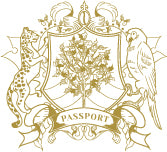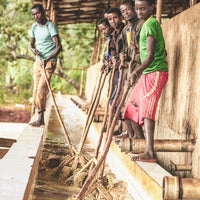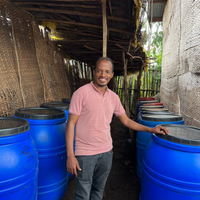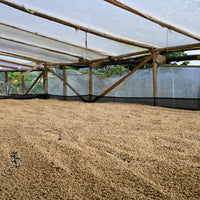Timor Leste Lulirema Natural
Origin: Timor
Region: Lulirema
Sub Region: Hatolia A
Altitude: 1380 meters above sea level
Co-Op: Lulirema Washing Station
Owner: Farmpro Unipessoal LDA
Variety: Timor, Typica
Process: Natural
Tasting Notes: Blueberry Jam, Melon and Tropical Fruit
After a 2 year hiatus, Passport is excited to have an amazing Timor Leste Natural back on the line up. For those that remember, we roasted the Lutlala Natural for the Black Coffee Friday event right at the start of the pandemic. This event got moved to an online event due to a lockdown and all coffees were sent out to the participating public as a cupping sample. We were super proud to put up a coffee not typically seen in Australia and the feedback we received was nothing short of incredible. We are once again super proud to have another coffee from this region and am confident it will once again exceed expectations.
Lulirema washing station pays farmers far above the average cherry price in the region and it processes their cherry with an eye towards quality.
Lulirema washing station is owned and managed by Farmpro Unipessoal LDA. Established by Peter Dougan, an Australian living in Timor Leste, Farmpro provides seeds, fertilizer and training to smallholder vegetable producers. Farmpro purchases their crops and distributes them to supermarkets and restaurants, as well as through a CSA program for individuals. In 2019, Peter began working with Sucafina to begin working with coffee producers in the area. They established a washing station in Letefoho and purchased cherry from farmers. One of Farmpro’s core objectives is to help farmers increase the quality and quantity of their coffee crop. Since that first year, the prices Farmpro has been able to offer farmers for their coffee cherry has been about 30% higher than the average price in the area. They’ve continued expanding to work with new farmer groups and processing sites.
Lulirema station is operated by Rogelio. Rogelio is a longtime Farmpro employee who helped set up their first washing station in Letefoho back in 2019. Rogelio advocated for a washing station in his hometown in Lulirema and he helped set up the washing station for the 2021 crop. The cup quality in that first season was impressive and continues to impress us each year.
Farmers deliver cherry to Lulirema washing station. At intake, cherry is floated to remove any underripes. The prices Farmpro has been able to offer farmers is about 30% above the average price in the region. Cherry is laid on raised beds to sundry. Cherry is raked frequently to ensure even drying. It takes 26 yo 28 days for cherry to dry.
Timor-Leste has had a long and tumultuous history that has seen colonization, several occupations, independence and a long and difficult path to peace. Coffee has played a role in Timor-Leste’s economy since the beginning of the country’s modern history.
While coffee production in Timor-Leste continues to expand and quality continues to improve, the climate presents difficulties. The arid weather and short rainy season make it difficult for coffee cherry to grow. On top of contrarian weather, the low nutrient-content in the soil and negligible access to fertilizers and pesticides makes it more difficult for coffee trees to thrive. The average farmer currently collects only about 500 grams of green coffee per tree (2-3 kg cherry).
Timor-Leste’s coffee industry is prevailing in the face of these difficulties. Both quality and productivity are rapidly increasing. Small changes are increasing coffee quality by leaps and bounds, while several programs, funded by NGOs, are working to fundamentally change coffee harvesting and processing in the country.
The government is also playing a role in improving coffee quality by investing in infrastructure, such as new roads, that will make transporting both cherry and parchment easier. Timor-Leste is poised to be a reliable producer of good quality and versatile coffees.
We’re proud to be active in Timor-Leste. We work alongside farmers, cooperatives and agricultural extension officers to help farmers increase yields and quality. Our goal is to work with our partners to help farmers reach an average yield of 2.5 kilograms per tree while also increasing quality. Higher production and higher quality will mean larger incomes for farmers.







